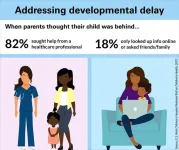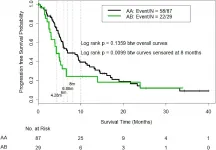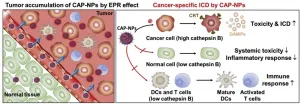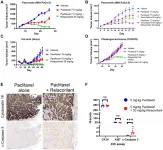(Press-News.org) 28 June 2021: Despite continuing controversies over its value in improving birth rates in IVF, testing embryos for their chromosomal content has become routine in many fertility clinics. Embryos with a normal complement of chromosomes (known as "euploid") are known to have a good chance of implanting in the uterus to become a pregnancy, while abnormal embryos (aneuploid) have no chance. Testing embryos for aneuploidy (known as PGT-A*) has so far required a sample single cell or several cells taken from the embryo by biopsy, and this too has raised fears over safety such that a search for non-invasive methods has arisen in recent years.
Now, a new study suggests that euploid embryos can be visually distinguished from aneuploid according to artificial intelligence references of cell activity as seen by time-lapse imaging - and thus without the need for cell biopsy. The results of the study will be presented today at the online annual meeting of ESHRE by Ms Lorena Bori from IVIRMA in Valencia, Spain, on behalf a joint research team from IVIRMA Valencia and AIVF, Israel, co-directed by Dr Marcos Meseguer from Valencia and Dr Daniella Gilboa from Tel-Aviv.
The visualisation of embryo growth has been revolutionised in the past decade by time-lapse technology, which provides an image of each moment of an embryo's development until as a blastocyst it is ready for transfer to the uterus. However, so far information from time lapse imaging has not been able to offer an accurate assessment of an embryo's chromosomal status. Now, however, computer vision with AI may provide an objective and reliable prediction.
Behind the study lay the finding that chromosomally normal embryos begin their development as blastocysts at a slightly earlier time than aneuploid embryos, and this can be identified in computer vision by microscopic measurement of the cells' edges. This is known to be a precise method of quantifying the number of cells and cell cycle of the blastomeres (the cells which form the embryo). Applying this finding, the study thus retrospectively compared computer vision-based measurements of cell edges in the time-lapse videos of 111 euploid and 120 aneuploid embryos.
Results showed that the aneuploid embryos achieve their growth to the blastocyst stage faster than the euploid embryos, said the authors, because of their higher level of cell activity.
"Our results show for the first time," they added, "that an AI based system can precisely measure microscopic cell edges in the dividing embryo, which allowed us to distinguish between euploid and aneuploid embryos."
"Our early results had shown that euploid and aneuploid embryos are visually distinct," explained study director Marcos Meseguer, "significantly enough to merit further computer vision investigation and to test if a non-invasive PGT-A test could conceivably match the results of current invasive methods - without the cost and damage to the embryo that the invasive methods might cause. We used the measurement of cell edges as a proxy for cell activity (which include DNA replication and cell division) and achieved 73% sensitivity and specificity in our results."
While Meseguer described the results and future research as "one of the milestones" of AI in reproductive medicine, he said further studies are still needed to test and validate the algorithms in larger datasets. For example, the model so far classifies mosaic embryos (with a combination of euploid and aneuploid) as abnormal, even though some studies have shown their viability in pregnancy.
Nevertheless, Meseguer acknowledged that all methods so far explored for testing embryos without the need for biopsy have not proved as accurate as the traditional biopsy methods. "Our present algorithm faces the same situation," said Meseguer. "Our prediction capability is still limited, in which case our models could only be applied in those patients who do not require genetic testing according to a pre-defined medical indication. So our test so far could only be used to reduce the risk of selecting a chromosomally abnormal embryo for transfer."
However, results from this time-lapse visualisation approach show it to be fast and economical, particularly when compared with the non-invasive methods so far explored (which rely on analysing the culture media in which the embryo develops). "These [other non-invasive] results," said Meseguer, "take several days to produce because of the genetic analysis, which forces patients to freeze all their embryos and delay their infertility treatment." While the AI method described in this study needs further validation, it is simple in its concept, can be home-built, and may yet provide the most efficient means of testing embryos for aneuploidy and their selection for transfer.
INFORMATION:
Presentation O-084, Monday 28 June 2021
Computer vision can distinguish between euploid and aneuploid embryos. A novel artificial intelligence (AI) approach to measure cell division activity associated with chromosomal status.
* Non-invasive methods of embryo assessment
Techniques of preimplantation genetic testing for aneuploidy (PGT-A) have progressed through three technological stages in the past 20 years, but all have required a biopsied cell (or cells) for their analysis. The latest innovations are looking ahead to non-invasive techniques, which so far seem dependent on testing for chromosomes in the culture media in which the embryos are stored.
Despite its relatively long history in reproductive medicine, PGT-A remains a subject of some controversy, with no clear results from robust randomised trials indicating a benefit in live birth rates.
28 June 2021: Only now, more than a year after Covid-19 infection rates first hit peak levels and in the knowledge that receptors for SARS-CoV-2 are present in the ovary, are we able to assess the effect of the virus on reproductive function. Now, a new study has shown that the ovarian reserve of women previously infected with the virus was not adversely affected, and that their chance of success from fertility treatment remained as it was before infection.*
The study, which monitored hormone levels in women having IVF at one of 11 clinics in the IVI group in Spain between May and June 2020, is ...
ANN ARBOR, Mich. -- As their infants and toddlers grow, many parents may wonder if their children are walking, talking and socializing when they're supposed to be.
In fact, nearly a quarter of parents have suspected their child might be delayed in their development, a new national poll finds - but they may not always share these concerns with a doctor.
Among parents who worried that their child was behind in hitting milestones, nearly one in five did not seek advice from a healthcare or childcare provider, according to the University of Michigan C.S. Mott Children's Hospital National Poll on Children's Health.
"Parents may be unsure whether their child is progressing appropriately for their age and are on track with ...
Arlington, Va., June 28, 2021 - Designed initially for entertainment purposes, escape rooms are proving their value as medical training tools as demonstrated by the Central Texas Veterans Health Care System. Staff there have used the concept for a flu pandemic escape room and is reporting increased staff handwashing and acceptance of flu vaccines as a result.
The escape room is the brainchild of Gracia Boseman, RN, MPH, and Kristy Causey, MSN, RN, who are END ...
Sophia Antipolis - 28 June 2021: A study in more than 200,000 individuals has found that patients with heart failure are more likely to develop cancer compared to their peers without heart failure. The research is presented today at Heart Failure 2021, an online scientific congress of the European Society of Cardiology (ESC),1 and published in ESC Heart Failure, a journal of the ESC.2
"This was an observational study and the results do not prove that heart failure causes cancer," said author Dr. Mark Luedde of the Christian-Albrechts-University of Kiel and Cardiology Joint Practice Bremerhaven, Germany. "However, the findings do suggest that heart failure patients may benefit from cancer prevention measures."
Heart failure affects around 65 million people ...
Oncotarget published "The presence of polymorphisms in genes controlling neurotransmitter metabolism and disease prognosis in patients with prostate cancer: a possible link with schizophrenia" reported that polymorphisms of neurotransmitter metabolism genes were studied in patients with prostate cancer (PC) characterized by either reduced or extended serum prostate-specific antigen doubling time corresponding to unfavorable and favorable disease prognosis respectively.
The following gene polymorphisms known to be associated with neuropsychiatric disorders were investigated:
A. ...
Oncotarget published "Predicting clinical outcomes using cancer progression associated signatures" which reported somatic mutation signatures are an informative facet of cancer aetiology, however they are rarely useful for predicting patient outcome.
The aim of this study is to evaluate the utility of a panel of 142 mutation-signature–associated metrics for predicting cancer progression in patients from a ‘TCGA PanCancer Atlas’ cohort.
Cancer specific machine learning models were built using the output from the P142 panel to predict patient ...
Oncotarget published "Insulin-like growth factor 1/Child-Turcotte-Pugh composite score as a predictor of treatment outcomes in patients with advanced hepatocellular carcinoma treated with sorafenib" which reported that this study investigated the association of the IGF/CTP score with overall survival and progression-free survival of HCC patients treated with sorafenib.
The authors calculated the IGF/CTP score and used the Kaplan-Meier method and log-rank test to estimate and compare the time-to-event outcomes between patient subgroups.
171 patients were included, 116 of whom were CTP class A. Median ...
Unlike conventional cancer drugs that attack and kill cancer cells directly, anti-cancer immunotherapy, which kills cancer cells by strengthening the body's immunity, is a novel type of cancer treatment currently attracting increased attention. Unfortunately, a minority of cancer patients who have some degree of pre-existing immunity only benefit from anti-cancer immunotherapy.
Recently, 'doxorubicin', a cancer treatment drug, has been shown to boost patients' immune response by releasing various components when cancer cells are killed. However, as the toxicity and inflammatory responses induced by doxorubicin can affect normal cells in addition to cancer cells, it can lower ...
Oncotarget published "Glucocorticoid receptor antagonism promotes apoptosis in solid tumor cells" which reported that to guide studies in cancer patients, relacorilant, an investigational selective GR modulator that antagonizes cortisol activity, was assessed in various tumor types, with multiple cytotoxic combination partners, and in the presence of physiological cortisol concentrations.
In the MIA PaCa-2 cell line, paclitaxel-driven apoptosis was blunted by cortisol and restored by relacorilant.
A screen to identify optimal combination partners for relacorilant showed that microtubule-targeted agents consistently ...
PHILADELPHIA-- In addition to sickening and taking the lives of millions across the globe, COVID-19 complicated patient care in a range of less-direct ways, from increased incidence of END ...





